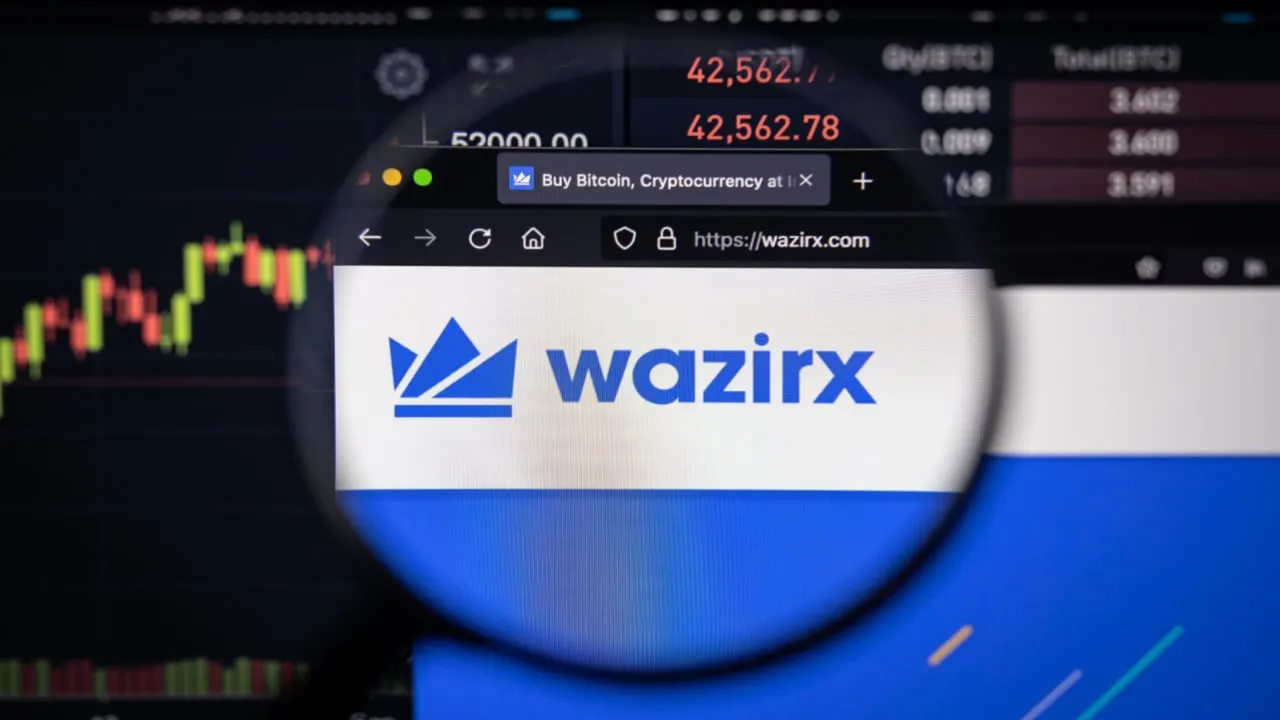Dear @NischalShetty you said you don’t have ownership of the Wazirx exchange.
I would like to understand:
How did you reverse completed trades back to crypto?
Without database access (admin access) how trades can be reversed ?
If you don’t own the platform or the crypto,…
— Pushpendra Singh (@pushpendrakum) August 26, 2024
Coin Prices
BTC
$66,531.00
-3.92%ETH
$1,930.61
-4.63%XRP
$1.35
-3.85%BNB
$593.66
-4.20%USDC
$0.999969
-0.00%SOL
$79.86
-5.18%TRX
$0.275202
-0.92%FIGR_HELOC
$1.032
-0.22%DOGE
$0.088997
-4.34%WBT
$50.23
-3.56%BCH
$510.62
-1.15%USDS
$0.999642
-0.06%ADA
$0.252951
-4.12%LEO
$8.41
-2.23%HYPE
$28.88
-3.14%USDE
$0.999225
0.04%CC
$0.165407
0.26%XMR
$335.63
2.35%LINK
$8.24
-4.01%USD1
$0.999969
-0.03%XLM
$0.151404
-5.18%LTC
$51.27
-3.96%PYUSD
$1.00
0.01%HBAR
$0.087898
-3.94%ZEC
$226.04
-3.20%AVAX
$8.51
-3.19%SHIB
$0.00000581
-3.72%SUI
$0.883011
-5.47%RAIN
$0.00974379
-5.96%TON
$1.30
-3.41%CRO
$0.075746
-3.99%WLFI
$0.100733
-7.22%XAUT
$5,035.13
0.63%M
$1.41
-3.00%UNI
$3.83
13.70%PAXG
$5,070.16
0.86%DOT
$1.24
-3.69%MNT
$0.604543
-4.73%BUIDL
$1.00
0.00%USDF
$0.996722
-0.06%ASTER
$0.678803
2.52%BGB
$2.32
-5.75%AAVE
$106.17
-3.15%USDG
$0.999831
-0.02%USYC
$1.12
0.00%HTX
$0.00000166
-0.30%RLUSD
$1.00
0.00%OKB
$72.22
-4.54%SKY
$0.065856
-4.51%PEPE
$0.0000035
-3.75%TAO
$146.05
-7.29%BFUSD
$0.999535
0.01%ICP
$2.31
-2.63%ETC
$8.04
-4.02%NEAR
$0.947293
-5.04%PI
$0.132158
-4.43%ONDO
$0.238109
-3.80%GT
$6.82
-2.44%PUMP
$0.00185402
-5.18%KCS
$7.91
-3.13%WLD
$0.367696
-3.39%QNT
$69.41
-1.83%USDD
$0.999602
-0.04%HASH
$0.0188769
8.24%USTB
$10.99
0.01%ATOM
$1.92
-0.89%POL
$0.088954
-4.00%ENA
$0.109773
-5.54%USDTB
$0.998776
-0.08%KAS
$0.03139048
0.20%NIGHT
$0.04804111
-2.05%NEXO
$0.797109
-3.08%ALGO
$0.088818
-5.21%FLR
$0.00926075
-4.14%MYX
$4.02
-32.11%JAAA
$1.026
0.00%TRUMP
$3.13
-5.15%EUTBL
$1.24
-0.41%APT
$0.928995
-5.99%USDY
$1.11
0.41%XDC
$0.03519696
-0.54%OUSG
$114.25
0.01%FIL
$0.861877
-5.40%RENDER
$1.25
-5.51%VET
$0.00748356
-4.23%ARB
$0.106789
-4.21%BDX
$0.080599
0.42%MORPHO
$1.083
-6.01%USD0
$0.999626
0.21%JTRSY
$1.094
0.01%USDAI
$0.999782
-0.02%GHO
$0.999975
-0.03%BONK
$0.00000583
-2.82%ZRO
$2.48
40.57%A7A5
$0.01277376
-0.68%TUSD
$0.998992
-0.03%FTN
$1.092
0.03%SEI
$0.070354
-3.64%EURC
$1.19
-0.24%PIPPIN
$0.456395
17.82%JUP
$0.138264
-6.17%STX
$0.249384
-2.99%CAKE
$1.29
-3.46%XTZ
$0.389673
-3.83%DASH
$33.15
-5.49%DCR
$23.05
-5.53%FDUSD
$0.998732
-0.01%CHZ
$0.03843704
-3.90%STABLE
$0.02225368
-5.90%IP
$1.11
-4.91%KAU
$162.04
0.38%PENGU
$0.00595346
-3.23%OP
$0.175036
-5.03%JST
$0.04117925
-4.36%VIRTUAL
$0.536921
-4.55%RIVER
$17.90
-1.01%CTM
$0.080163
-4.82%FET
$0.152224
-2.80%CRV
$0.227487
-3.33%LIT
$1.33
-10.53%BTT
$0.00000033
-2.14%USX
$0.999373
-0.02%SUN
$0.01664404
-0.43%GNO
$121.11
-3.68%KAIA
$0.054331
0.02%KITE
$0.176093
-4.34%NFT
$0.00000032
0.36%SYRUP
$0.268052
-2.78%KAG
$83.48
2.41%ETHFI
$0.437163
-0.29%INJ
$2.96
-3.00%CRVUSD
$0.999673
-0.22%PRIME
$1.018
0.00%USR
$0.999441
-0.05%H
$0.151507
3.08%FLOKI
$0.00002852
-4.53%IOTA
$0.064244
-4.24%GRT
$0.02568521
-3.66%LDO
$0.323354
-5.37%BSV
$13.67
-2.37%FRAX
$0.989087
-0.34%OHM
$17.13
-1.35%JASMY
$0.0053909
-1.33%TIA
$0.299716
-6.15%SPX
$0.28218
-2.88%2Z
$0.075534
-3.22%ADI
$2.63
0.28%TEL
$0.00268943
-5.75%AERO
$0.277854
-9.36%AXS
$1.48
-2.83%ZK
$0.021634
1.00%USTBL
$1.074
0.01%PYTH
$0.04250015
-5.37%STRK
$0.04565755
-2.63%BTSE
$1.45
2.54%AB
$0.00233474
-2.80%UDS
$1.85
-12.22%CFX
$0.04419823
-4.28%NUSD
$0.998588
-0.22%YLDS
$0.999905
-0.01%USDA
$0.988101
0.49%SAND
$0.081332
-5.46%AUSD
$0.99983
-0.02%ENS
$5.47
-3.97%WIF
$0.204854
-5.66%BCAP
$22.27
0.00%MON
$0.01848573
-3.35%BAT
$0.133509
2.99%APEPE
$0.00000095
6.45%THETA
$0.198077
-1.46%MWC
$17.72
-3.13%ZBCN
$0.00195537
-8.07%PC0000031
$1.00
0.00%ULTIMA
$4,994.73
-3.19%SENT
$0.0260732
-4.76%BORG
$0.191683
-4.17%TWT
$0.450597
-8.41%XCN
$0.00505532
-4.27%VSN
$0.052393
-1.17%FF
$0.079565
0.37%BARD
$0.815625
-0.46%NEO
$2.60
-1.09%MANA
$0.095612
-4.35%LUNC
$0.0000334
-3.01%GLM
$0.182484
-1.12%GALA
$0.00385685
-4.44%PENDLE
$1.10
-2.57%CUSD
$1.013
-0.21%WFI
$2.20
-6.94%FARTCOIN
$0.173229
-8.01%XPL
$0.079582
-2.67%IUSD
$0.99954
-0.19%FDIT
$1.00
0.00%CVX
$1.81
-3.47%FLUID
$2.13
-5.42%MX
$1.80
-0.09%THBILL
$1.016
0.01%AWE
$0.084063
1.58%USDF
$0.997907
-0.03%KOGE
$47.98
-0.00%SATUSD
$0.994343
-0.01%REAL
$0.050543
-4.33%EURS
$1.25
-0.12%B
$0.155428
-6.64%HNT
$0.822607
-0.32%COMP
$15.78
-4.32%XEC
$0.00000758
-2.77%QRL
$1.93
-4.91%GUSD
$1.001
0.26%RAY
$0.555246
-5.58%S
$0.03936605
-4.06%SKR
$0.02580486
7.51%TRAC
$0.322716
-3.79%WEMIX
$0.312054
-1.11%RLB
$0.078816
-1.17%ACRED
$1,096.87
0.06%RUNE
$0.383228
-4.26%BERA
$0.630903
20.54%BMX
$0.391489
-0.17%1INCH
$0.092468
-2.49%EGLD
$4.43
-1.08%A
$0.079902
-2.09%LION
$0.0041811
-4.71%SOSO
$0.464908
-1.88%AMP
$0.00148447
-5.33%IMX
$0.147557
-4.86%SFP
$0.248595
-6.21%WAL
$0.076632
-4.45%GOMINING
$0.300162
-3.34%KTA
$0.253927
2.56%ZANO
$8.02
-12.29%OZO
$0.129201
-1.55%MF-ONE
$1.055
0.02%PUSD
$0.999462
-0.24%DUSD
$0.998779
0.04%BEAM
$0.00229894
-3.10%DOLA
$0.994791
-0.07%ICNT
$0.452233
0.07%AR
$1.75
-6.61%EIGEN
$0.193182
-4.05%LPT
$2.28
-5.21%FRXUSD
$0.999871
-0.06%0G
$0.523294
-0.87%KMNO
$0.02849114
-3.07%REUSD
$1.06
0.02%APE
$0.121775
-2.38%MELANIA
$0.114137
-5.64%EDU
$0.12996
-6.71%
